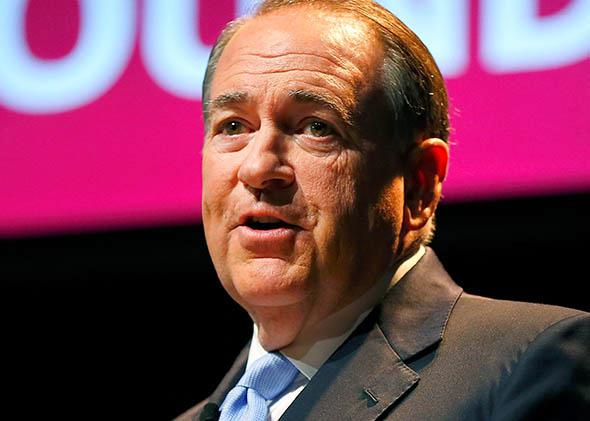For his opening pitch to Republican voters, Mike Huckabee channeled a little of Elizabeth Warren’s fiery populism. Washington, he said in his video announcement, “has done enough lying and stealing. I’ll never rob seniors of what our government has promised them and even forced them to pay for.”
He hit this note again in his first campaign speech, with a few shots at his GOP competitors for good measure. “There are some who propose that to save the safety nets like Medicare and Social Security, we ought to chop off the payments for the people who have faithfully had their paychecks and pockets picked by the politician, promising them that their money would be waiting for them when they were old and sick,” said Huckabee. “My friend, you were forced to pay for Social Security and Medicare. For 50 years, the government grabs the money from our paychecks and says it’ll be waiting for us when we turn 65. If Congress wants to take away someone’s retirement, let them end their own congressional pensions, not your Social Security.”
What Huckabee understands—and what makes him a serious presence in the GOP field—is that many Republican voters, even those on the right, aren’t opposed to generous government spending on individuals. Disproportionately older or elderly, they’re strong supporters of Social Security and Medicare, which they see as earned benefits. Instead, they’re opposed to spending on people perceived as undeserving. Texas Gov. Rick Perry discovered this the hard way in the 2012 primary, when he blasted Social Security as a “Ponzi scheme.” Seniors turned against him:
To the older, white Tea Party voters Perry needs to win the Republican nomination, this simply isn’t true. “We paid into Social Security,” said Steven Anderson, a member of the Low Country 9/12 project and a retiree. His wife, Judie, chimed in, “It’s not an entitlement, it’s ours.” The same went for Art LeBruce, a retired Army medic and longtime member of the group: “That’s my money that I put into Social Security — I deserve it.”
Huckabee isn’t the only Republican to grasp this dynamic. In 2010, Republican candidates slammed President Obama and the Democrats for “gutting Medicare” to pay for the Affordable Care Act, fueling the wave that gave Republicans a House majority. In the next election, Mitt Romney and Rep. Paul Ryan would try the same, attacking Obamacare as a giveaway to unnamed “others” at the expense of seniors, even as they pushed plans that required large cuts to the social safety net. And most famously, George W. Bush expanded the welfare state for seniors with a massive prescription drug benefit.
But unlike Bush—who wanted private accounts for Social Security—or Ryan—who wanted to bring vouchers to Medicare—Huckabee makes no pretense of his support for “entitlement reform.” Whereas Romney pandered to seniors, Huckabee actively supports their vision of a gerontocratic welfare state, with support for the children and grandchildren of these beneficiaries. It’s of a piece with his former Arkansas governorship—where he signed health care legislation for uninsured children and funded education programs for low-income students—and it’s also why he’s defended the Social Security disability program. “To assume that anybody who is disabled is really fraudulent, I think that’s an insult to a person,” he said to reporters on Wednesday. “You should make the government prove that person isn’t in need rather than the person having to.”
Huckabee’s style has appeal. A February 2013 survey from the Pew Research Center shows scant Republican support for Social Security or Medicare cuts. Likewise, in a follow-up poll, 62 percent of Republicans said it was more important to keep retirement benefits at current levels than it was to reduce the deficit. By contrast, 55 percent of Republicans said it was more important to reduce the deficit than to fund programs for the “poor and needy.” But you need more than appeal to win a presidential primary, and there, Huckabee has trouble.
In 2008, the governor’s brand of social conservatism and welfare state policies gave him a solid win in the Iowa caucuses, which quickly unraveled when he couldn’t raise the millions of dollars needed to build and sustain a national political campaign. Republican voters might like Huckabee’s blend of culture war politics and spending for retirees, but Republican donors are more skeptical. They want tax cuts, but—as liberals need to eventually accept—any welfare state will need more tax revenue, and eventually broad tax hikes, to stay sustainable. Among Republican elites, Huckabee was anathema, and so, he stumbled.
If anything, this is more true now than it was eight years ago. Not only are elites hungry for an expansive conservative agenda, but the most powerful donors—billionaires like Charles and David Koch and Sheldon Adelson—are committed to the small government agendas of more mainstream conservatives like Gov. Scott Walker or Sen. Marco Rubio. And if you’re an anti-government social conservative, why vote for Huckabee when there’s Sen. Ted Cruz or even Gov. Bobby Jindal?
The irony in all of this is that, far more than libertarians like Sen. Rand Paul, Huckabee represents an untapped constituency in modern American politics: white, rural, traditional, and nationalistic, but also generous with benefits for children and the elderly. As a policy perspective, it makes more sense than the GOP position of small government, unrestrained markets, and social conservatism, which exposes families to the invisible hand without protection from its capriciousness.
Seventy-five years ago, this would have been the Dixie branch of the New Deal coalition. Today, this kind of coalition is a mainstay in European politics—where center-right parties support a kind of conservative social democracy—but largely absent from America. Here, it lacks a place in either party. Republicans are too hostile to social spending while Democrats—who represent the so-called “undeserving” poor—are both too diverse and too permissive on social issues such as immigration, marriage, and abortion rights. In Huckabee, these voters have a candidate. They just don’t have a party.
